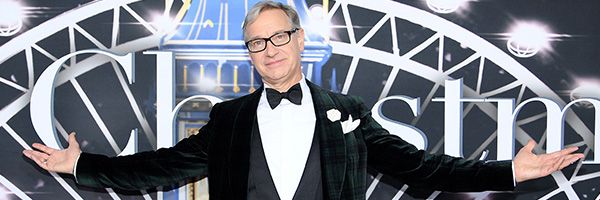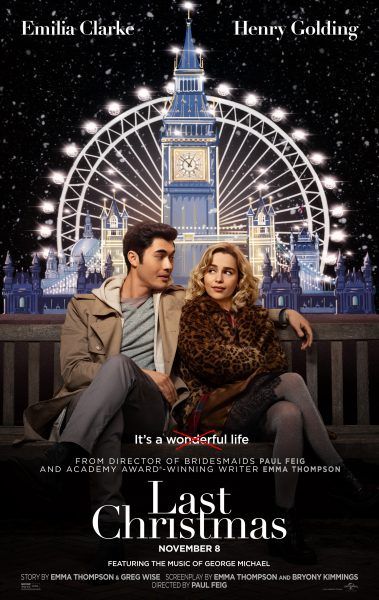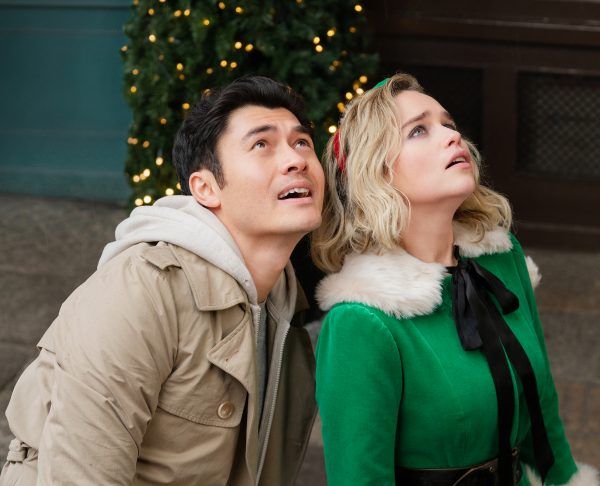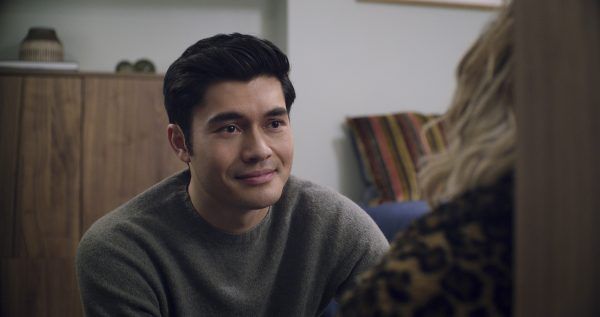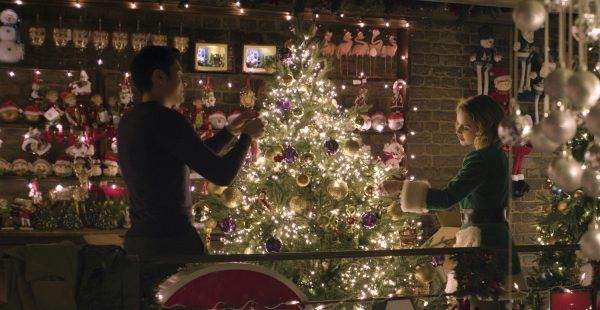From director Paul Feig and Academy Award-winning screenwriter Emma Thompson, and inspired by the music of George Michael and Wham!, the romantic dramedy Last Christmas follows Kate (Emilia Clarke), a young woman with a knack for making bad decisions, who finds herself spending the holidays dressed as an elf in a year-round Christmas shop. When she meets Tom (Henry Golding), he seems too good to be true, but Kate finds herself allowing him and the magic of Christmas in London to open her heart to unexpected possibilities.
During this 1-on-1 phone interview with Collider, director/producer Paul Feig talked about his reaction when Emma Thompson emailed him this script, why he wanted to take on this project, living up to the legacy of George Michael (who gave his blessing to the film), making a timeless Christmas movie, what makes a good romantic comedy, finding the right balance of laughter and tears, why he likes to do many test screenings, and the most challenging London location to shoot in. He also talked about having finished the first draft of the script for his monster movie Dark Army, when he’s hoping to shoot that, and the appeal and tone of the project.
Collider: First of all, thank you for making me both laugh and cry, in a movie theater. It’s always fun to do that around total strangers.
PAUL FEIG: My pleasure. It’s my goal. It’s always a proud moment, for all of us, when we fall apart. I feel the same way.
I have to say that I never could have imagined that there could be a movie inspired by the Wham! song “Last Christmas,” and that the movie would be written by Emma Thompson. So, when you got an email from her saying, “I think we’d have fun doing this together, give it a read,” What was your reaction to that? Did it seem totally crazy, or was that aspect of it part of what appealed to you about it?
FEIG: A little bit of both. You definitely pinch yourself and go, “Wow, an Oscar-winning writer just sent me a script, and I’m the only one she sent it to.” It was like a dream come true. She and I almost worked together the previous year, ‘cause I was supposed to direct Late Night, and then our schedules didn’t work out. But I had flown to London and spent the day with her, talking about the character, and we walked around Hampstead Heath and had a pub lunch and had too many Bloody Mary’s together, and just became really close friends. And so, after Late Night didn’t work out, we just stayed in contact and were always like, “What are we gonna do together? We have to do something together!” But I never expected that would result in her sending me a script. I read it immediately, and it just blew me out of the water. It also blew another project I was about to do out of the water, too. I literally was about to sign on the dotted line on another movie and had to do the horrible, “Guys, I’ve met someone else. We have to talk.”
Did you also feel a certain sense of responsibility to live up to the legacy of George Michael, especially knowing that he’d been aware of the project, he’d had conversations about it, and he ultimately gave it his blessing? Does that also add some weight to it?
FEIG: Yeah, it does. It really sobers you up, as far as how you wanna use his music. The funny thing was, in the script, there were little markers of, “This could be a good place to play some George,” but that was the extent of it. I don’t think any of us really expected that the soundtrack was gonna become all about George, but it just naturally grew because his DNA was all over it and because of the fact that it was based on that. He was aware of it, and the issue of homelessness, that’s in it, was a cause of his and it’s in there partly because of him wanting that cause put in there. And then, his estate had us watch this two-hour documentary, that he had directed, about his career, that was just unbelievable. That’s where I went from going, “Yeah, he was a great pop star,” to going, “Wow, he was one of the most talented voices that we’ve had, for a long time.” And then, I went, “This has to be his voice. This music has to be all over this movie, but in a way that’s organic to it. That’s when we made Kate a George Michael fan. She wanted to be a singer, and she was inspired by George and felt a kinship to them because they’re both underappreciated and misunderstood, in their time, as she likes to say. And then, finding the song “Heal the Pain” was a revelation to me. It was the theme song for the movie, even more than “Last Christmas” is. So then, we got that in there, and it just kept growing.
When you make a very clear Christmas holiday movie, you not only want to get people into theaters to see it, but you also have the goal of keeping them revisiting it, every Christmas holidays. Is that scary to think about, when you’re making it? Do you try to just think about telling a timeless story, and not think about that aspect of it?
FEIG: You have to not think about it, but at the same time, you wanna make sure that when people hopefully watch it multiple times, there’s new things that they’re gonna discover, as they go along. But, I do that with all of my movies. You can watch a The Simpsons episode a million times, or a Seinfeld episode a million times, and I think movies should be that way, too. It’s hard to say what makes them that way. You just need to have enough things layered in, that are fun to watch and that connect with you emotionally, that a movie should become comfort food, eventually, if it’s done right.
What do you love about a good romantic comedy, and what are the romantic comedy fails for you?
FEIG: Well, what I love about them is what my friend, Nancy Meyers, the director, says, which is that nobody isn’t interested in hearing about how somebody else fell in love, and it’s true. When you’re out and you meet a couple, what’s one of the first things you ask? So, how’d you guys meet? Everybody wants to know that story. And so, the best rom-coms just make you go, “I love these two people. I want them to be together. I’m gonna go through the fire with them to see what gets them there.” For me, I love the great comedies, like When Harry Met Sally, but I’m also such a fan of the old screwball comedy of the ‘30s and ‘40s, and those are all rom-coms. They were just very muscular, hilarious rom-coms, with men and women who are intellectual equals. Where rom-coms might’ve gone off the rails and why the genre went away for awhile is that they got very formulaic, and they became just about falling in love, as weird as that sounds, and about saving a woman, and that kind of thing. You need to have second and third layers of these things, and you need have to have complex characters that you can root for and understand, and then really go through the fire with. You need to have emotion, and you really have to be taken through the mill and rung out. You should end a great romantic movie and romantic comedy being emotionally exhausted because that’s what falling in love, getting a relationship going, and trying to keep it going is like. I don’t think work is the right term, but it just takes a lot of energy.
How hard is it to tell a beautiful romantic story without snark? When we live in a world with so much cynicism around us, all of the time, did you ever have to catch and stop the snark from rolling in?
FEIG: Yeah. It’s interesting, I think what drew me to this project, in the first place, was that it’s a very positive and a very uplifting message, but still, it isn’t toothless. I really responded to her character, when I first read it, because she’s a very complex female character, in that she is doing things that the audience doesn’t necessarily want her to do, and may not necessarily enjoy and might get frustrated with her about, but I like that. There’s this thing where male characters can be terrible and be Scrooge, and we’ll go along for the ride, but god forbid, a woman is misbehaving or unlikable, and we’re not gonna follow her. So, I liked that the script was taking a chance, in that way. As long as an audience can root for that character, even if they don’t agree with what she’s doing, or they get frustrated by something she does, that’s great. And then, you get somebody like Emilia Clarke, who you just automatically invest in, because there’s something about her that you care about. You can tell that there’s a humanity about her and a goodness about that makes you enjoy the ride of watching her heal herself, just like George’s song. He will heal her pain.
And let’s be honest, who doesn’t want to follow Henry Golding, just about anywhere he tells you to go?
FEIG: Yeah, right? It’s crazy. And that’s really who Henry is. That’s why I really wanted him to be in this movie. That’s the guy that I know.
So, are you really going from this sweet and romantic film to writing, directing and producing the monster movie Dark Army?
FEIG: I certainly am. I’ve already finished the first draft of the script, and I’m so excited about it.
That definitely seems like it’s a switch of gears. Was that part of the appeal of doing that?
FEIG: Yeah, if you look at movies and line them up, in chronological order, they’re all massive tonal shifts, just ‘cause I go from genre to genre. It’s my favorite thing. One of my favorite directors of all time was Howard Hawks, who made great Westerns, made great gangster movies, made great screwball comedies, made the sci-fi movie The Thing from Another World, and he did them all effortlessly. I get it because I don’t wanna make the same movie, all the time, and I don’t even wanna make the same kind of movie, each time. There are all of these different genres that I feel like I have something to add to, and it’s just fun because I like to find humor and comedy in everything. Genres come with a set of tropes and expectations and a formula, that then I can subvert, and by subverting it, I can get comedy and I can still be true to the genre, at the same time. That, to me, is just the most exciting thing in the world to do.
When are you looking to start shooting that?
FEIG: I’m hoping to start prepping, at the beginning of the new year. I just turned in my draft, to the higher ups at the studio, and I’m hoping we can figure out that we can do it and get the right budget for it. I’m on fire about this one. I see this so clearly, and it’s just a genre that I’ve always wanted to do. I love those old classic monster movies. I’m not necessarily a horror movie fan ‘cause I don’t like slashed slasher stuff, and I don’t like the cruelty of those things, but I like monsters. Monsters are just freaks and geeks, if you think about it.
Is that going to be comedic in tone, or will it be more serious?
FEIG: It’s gonna be the same tone that those classic movies had. James Whale, who is one of my favorite directors, treated the genre seriously, but he also had fun with it, at the same. I never make a parody. None of my movies are parodies. They just have fun with that genre, by treating it seriously, but then finding the extremes and having fun with those extremes.
You seem to have quite a lot of projects that you get behind, as a producer, but not necessarily as a director. How do you make that distinction, when projects come your way, and decide which projects you’ll produce versus which projects you’ll direct?
FEIG: Well, there are stories that I want to be told, and there are stories that I want to tell. The things that you want to be told, you produce and you find great people. I’m always trying to give opportunities to get some female filmmakers behind the camera and to help tell their stories, like we did with Jen Robinson and Someone Great. But then, finding the movies that I wanna do is a little harder because, first of all, it’s at least a year out of my life, and then it’s a 24 hours a day, seven day a week obsession, not sleeping ever, so it’s gotta be something that I’m just on fire about. I just know it when I find it. I don’t necessarily even know that I’m looking for it. Last Christmas was probably the last movie I thought I would ever be making, but that script came in and I read that script, and I was like, “This is just too good.” And then, I get very territorial about it and I’m like, “I wanna tell this story. I wanna make sure this story gets told properly.” If I have enough of an ego to think that I’m the one who can tell it the best, then I hang onto it, like a dog with a bone, and that’s my life for the next year, plus.
When it came to Last Christmas, how did you find the right balance of laughter and tears? Was it through test screenings, or do you have family and friends, or filmmaker colleagues, that you always screen stuff for?
FEIG: No, I only do test screenings. I don’t do friends and family screenings, ever, because I find they actually are very misleading. People who know you are gonna react differently than people who don’t know you. People who are comedy professionals are going to laugh at things that other people don’t laugh at. So, I just do many, many test screenings, and I start early in the process. I’ll put my first cut together within three to four weeks, and then try to get it up in front of an audience before I’ve become too precious about anything, or fall in love with anything. And then, we just keep doing it, after that. We’ll do it multiple times, and see what works and what doesn’t, and record the audience. What they don’t laugh at, we take out. What they do laugh at, we keep in. And then, what they chuckle at, we try to get them to laugh at, by switching out to a stronger joke or moment. When things don’t work for them, we take it out and either fix it or eliminate it. We’re always trying to shorten it and get down to a reasonable size. And then, by the time that I lock picture, I usually know that it works with most audiences. And then, we’re done.
Was there anything with Last Christmas that, through those test screenings, changed the film in a big way, or were you pretty much on the track that you wanted to be on?
FEIG: We were on the track, but there were a few things that we wanted to adjust, and a couple of things that we actually wrote new scenes for and shot a couple of new things for because we felt like we were missing a couple of things. That’s all stuff we learned from the test audiences. So, by the time we got to that final version, we felt really good and we felt like we had solved anything that we needed a little bit of solving, or needed a little bit of extra help.
Was there a scene or moment that you were most disappointed that you had to lose, even if you knew it would make the film better?
FEIG: Yeah, you always have to kill your babies and lose a few that you love. There’s one scene, in particular, between Michelle Yeoh and Emilia Clarke that I just absolutely loved. Michelle is so funny in it, but there are just beats that you don’t need for the story. Even though it’s delightful, the audience, ten minutes down the line, goes, “Is this getting long?,” so you’ve just gotta lose it. But the good thing is that, with DVD and streaming and all of the extras you can do now, we can put those in the deleted scenes, which we always do.
What were the challenges of shooting in these locations, and was there one that was most difficult to shoot in?
FEIG: It was all challenging because we were shooting in very popular areas. Covent Garden was such a character in the script, and I remember thinking, “There’s no way they’re gonna let us shoot Covent Garden. It’s just too popular and crowded. How am I gonna recreate Coven Garden somewhere?” But then, we just reached out to them, and they were very open to it. They said, “The only thing is that you have to start shooting at 2:00 am and you have to be out of there by noon.” So, our very first week of shooting, we started at two o’clock in the morning, and shot all night, every night. It was hard ‘cause you’re tired, but the same time, it’s so energizing because you’re in this beautiful location that you didn’t think you were gonna get to be in. And it had the natural Christmas lights up ‘cause we were shooting before Christmas. It was just very cold. Cold and fatigue were against us, but everything else was on our side.
Last Christmas is now playing in theaters.

